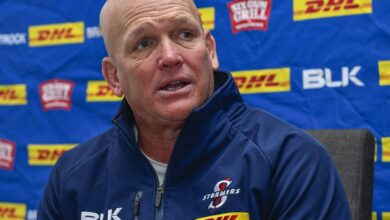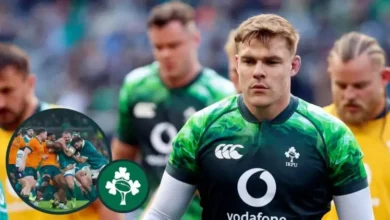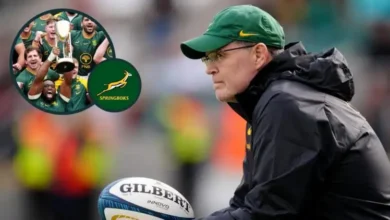Wales Grand Slam hero named in brain injury case speaks out in first interview

Ian Gough is one of 300 players suing rugby’s governing bodies over concussion
For the first time since being named in the brain injury lawsuit that has shook rugby, former Wales international Ian Gough has spoken out, claiming that during his career, concussions were not given enough serious consideration.
Gough, one of the around 300 rugby players suing the regulatory bodies of the sport, maintains that despite having several concussions over the course of his 18-year career, he was never told to miss a game due to one. According to him, there was a peer pressure culture in the sport that encouraged participants to endanger their health by playing.
Gough has had a number of medical examinations, and although he has not received the tragic news of several
other players, he has shown enough long-term effects of concussion to appear on the lawsuit against the game’s governing bodies. “I had concussions throughout my career but did I miss any games because of it? No I didn’t,” Gough told WalesOnline.
“I got concussed quite a few times but I never actually missed a game with it. I remember leaving the field concussed after having a bang to the head and as we got into the changing room someone from the staff rubbed my shoulder and said that should be alright for Saturday.
“I discovered that many people struggled with peer pressure and that people weren’t acting very sensibly in such situation. I remember getting struck hard by Martin Cory in Leicester and being knocked out with a concussion by Rowland Phillips’ high tackle during the first half of Pontypridd up in Neath.
“I played the entire game in spite of this. I was clearly showing signs of a concussion after full time, but nothing came of it and I didn’t miss any games. I was shaking and a little disoriented, so I couldn’t recall where the changing rooms were.
“There was, of course, the major concussion I sustained when Mark Jones punched and knocked me out while I was playing for Pontypridd in the Ebbw Vale. I had to take a few weeks off work to have my eye sewn up, but at the time, no concussion protocols were in place, so I was completely out cold.
At that moment, I had no idea what it was about or the potential harm it could do. I didn’t feel unwell at the moment, and I didn’t feel like I had a serious concussion problem the week after the incident.
At that moment, there was no testing, no process, and nothing we would do to make a determination. That was
During a hugely successful playing career which included spells at Newport, Pontypridd, the Dragons, the Ospreys, and London Irish, Gough was a player who put his body on the line game-after-game.
The 64-times capped Wales lock was a crucial part of Warren Gatland’s Wales side when the New Zealander first took the helm in 2008. Gough was a powerful tackling lock who prided himself on his physicality had no regard for his own wellbeing while on the field of play.
He didn’t realize the extent of the harm a concussion can do to the brain until much later in his career, when he attended a seminar on the subject. “We were having concussion talks at the Dragons,” he stated.
“I recall that a member of the medical staff essentially sat us down in a room and explained to us the risks associated with additional concussions, including the possibility of dying from one before the original had recovered. Her argument was that, depending on the person, healing from a secondary concussion could take up to several weeks if the original concussion had not yet recovered.
“If you get a secondary concussion before the first one has healed then you’ve got a 50% chance of fatality. That struck a big chord with me at that meeting. I thought I’ve had loads of concussions and I didn’t know that. I was 38 at that point.”
There remain many people ignorant of the effects of consistent head knocks in rugby. Even if a player does not fail a head injury assessment it does not mean he or she has not sustained a sub-concussion.
“Consecutive small concussions are really dangerous,” Gough tells WalesOnline.
“I was getting calf issues while I was at London Irish. The physiotherapist I saw, who administered these particular injections, was located in central London.
“I recall speaking with him once; he was a chief physician for English rugby at the time and was very interested in concussions. He claimed to have resigned from his position in 2013 because he believed that concussions were not being appropriately managed at the time.
“‘How many times have you been concussed?’ he said. I mentioned that I had experienced bodily symptoms like headaches, nausea, and blurred vision possibly two or three times in one season.
“He then asked me how many little concussions I’ve had and I said well I’ve had loads of those. He then said well that’s all a concussion.
“That’s the first time I knew about that and that was in 2013 just two years before I retired. The other ones are obvious where you are knocked out cold.”
Undoubtedly the biggest challenge facing rugby union today is how to deal with the very real threat of brain injuries sustained due to a high number of concussions. There are more and more cases of former professional players suffering the life-changing effects of what may seem like innocuous bangs to the head to some.
Some players may even end up in a care home by the time they are in their fifties or even forget the names of their loved ones. While that is the extreme end of the scale there are numerous examples emerging, with former Wales internationals Alix Popham and Ryan Jones having been diagnosed with early onset dementia.
When the likes of Gough embarked on a career in top flight rugby they knew there was a significant risk of broken bones, lost teeth, dislocations or even serious neck injuries, but they say they were not making an informed decision when it comes to the potential life-changing effects repeated concussions can cause.
“I did all the testing and I’m part of the suit but my injuries with that are quite minimal in comparison to other players,” said the 47-year-old. “I actually feel a little bit guilty in a weird way that I’ve dodged a bullet.
“I had lots of concussions. You talk about a Tuesday or a Wednesday session, if things don’t go right on a weekend physically you tended to go old school.
“If things didn’t go well physically in the game and tackles were missed and other certain things went wrong in the game it was nearly always the case you’d go flat out early in the week. With certain coaches it was always like murder ball.
“For instance, they’d be like here’s the ball, 10 players v 10 players, there’s ten yards and you’ve got to score or defend a try in a small channel fully apposed. You are flying into each other.
“You have emotions running high from the weekend where things haven’t gone well and somebody is vying for your position. So, you fly into people in those Tuesday and Wednesday sessions.
“The coaches used to laugh at times if some blood was spilt because it proved the boys were up for it. They were like, look they are up for it today, there’s blood, and there’s stitches.
That was all the way through my career. We had to get things done on Tuesday and Wednesday or else we wouldn’t perform well on the weekend. It was unusual that I witnessed someone miss a Saturday’s game due to an injury sustained on a Tuesday or Wednesday.”
Several charities have been pushing for new policies to be implemented in order to reduce the likelihood of concussions during games and to provide players with better care while they deal with the aftereffects of recurrent head trauma in recent years. One such nonprofit is Head for Change, which is also testing an educational program to be implemented in schools and community clubs while advocating for a decrease in the impact of training.

World Rugby has been both praised and criticised in equal measure when it comes to introducing laws which mitigate the chances of sustaining head injuries. Gough believes there needs to be a balance between making the game as safe as possible and watering down it’s physicality.
“They need to make the game as safe as possible but there’s got to be a balance,” he said. “One of The issues Alix Popham’s charity is pushing to change is the impacts in training.
“It’s about lessening the load in training and the amount of times you’re subject to these sessions where you are getting repetitive bangs. The big thing is making sure the concussion is healed before you play again.
“There was only one club I played for which pushed me through injuries which weren’t healed. Everybody plays with niggles but there’s a fine line between what’s a niggle and what needs to be rested.
“If you pull a ligament in your ankle then you can’t run on it, that has a process of rehab before you return to play. Until that’s right and you have stability and strength in that ankle then you can’t play.
“With injuries to the shoulder and lower limbs, there is a strict procedure, but over time, that hasn’t happened with concussions. Because concussions are a specific kind of injury, a physical therapist may ask you if you feel okay. If you respond positively, you can resume playing.
“From the outside, some may assume that because you have a strong enough will, you should be able to refuse, but in a professional rugby setting, things are very different. All boys want to do is play.
“Having the medical staff make that decision on your behalf is important. Most players will attempt to play if they are 50/50 or worse.”
While player welfare must be the game’s number one priority, it would be a big surprise if more players didn’t come forward with serious conditions like early onset dementia. The real threat is parents not allowing their children to participate in rugby because of the dangers of sustaining an injury to the brain.
And Gough is adamant the game is at a real cross-roads. “When I finished my career I didn’t want my sons playing, and they don’t play,” Gough admitted.
“Back in 2015, Andries Pretorius, then head of the Welsh Rugby Players’ Association, interviewed us about the issue. The overriding opinion from coaches and players was they didn’t want their children playing the game under the pressure of performing with injuries and concussions.
“That’s obviously a big worry. A lot of people will say we could bankrupt the game but my opinion is if you’ve done something wrong you’ve got to be accountable for your actions.
“If you knew something could make the game safer but you didn’t act on that then you are culpable. Your duty of care is to that human being and you should have made it safer.
“Why should people suffer into their 40s, 50s, 60s which is young in life given the average mortality rate is in the 80s? You are dealing with human beings.
“I adore the game and it given me so much, but it’s at a true crossroads. I was a young man from a Cwmbran council estate who lacked the extraordinary skill and aptitude of someone like Alun Wyn Jones, but I did the best I could with what I had.
“Rugby taught me so much, it’s amazing. I would detest it if children stopped playing because of what had happened.
“It must be made safer starting at the ground up. To avoid making those mistakes at a young age, people must be educated.
“You are choosing the best course of action for that person’s welfare so they can thrive and enjoy




